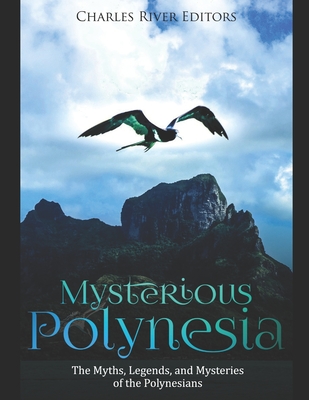Mysterious Polynesia: The Myths, Legends, and Mysteries of the Polynesians

Mysterious Polynesia: The Myths, Legends, and Mysteries of the Polynesians
*Includes a bibliography for further reading
Taking into account similarities of appearance, customs and languages spread across a vast region of scattered islands, it was obvious that the Polynesian race emerged from a single origin, and that origin Cook speculated was somewhere in the Malay Peninsula or the "East Indies." In this regard, he was not too far from the truth. The origins of the Polynesian race have been fiercely debated since then, and it was only relatively recently, through genetic and linguistic research, that it can now be stated with certainty that the Polynesian race originated on the Chinese mainland and the islands of Taiwan, the Philippines, Malaysia and Indonesia. Oceania was, indeed, the last major region of the Earth to be penetrated and settled by people, and Polynesia was the last region of Oceania to be inhabited. The vehicle of this expansion was the outrigger canoe, and aided by tides and wind patterns, a migration along the Malay Archipelago, and across the wide expanses of the South Pacific, began sometime between 3000 and 1000 BCE, reaching the western Polynesian Islands in about 900 BCE.
The name Polynesia derives from the ancient Greek meaning "many islands." The word was first used to describe the entirety of the South Sea Islands by the 18th century French writer and traveler Charles de Brosses, but technically, Polynesia refers specifically to an area described by a vast triangle that stretches across the southern Pacific, with Hawaii, Easter Island and New Zealand serving as the points. Close to the center of this triangle lies Tahiti, with the west limit defined by Samoa and Tonga, with a slight irregularity in the western edge of the triangle that serves to exclude Fiji, the Solomon Islands, the New Hebrides, and a handful of Melanesian and Micronesian islands. The Melanesian demographic tends to differ quite dramatically from the Polynesian in both appearance and culture, the former tending to be of darker complexion, while the latter is more characteristic of the South Seas islanders of popular mythology.
Furthermore, not all of the islands included in the broad delineation of Polynesia are the tiny islets and atolls of popular imagination, resplendent with blue lagoons, white sand beaches and pristine coral reefs. Most are located within the tropics and have all the characteristics of an island paradise, but many others, such as Easter Island, the Chatham Islands, and New Zealan
PRP: 86.34 Lei
Acesta este Pretul Recomandat de Producator. Pretul de vanzare al produsului este afisat mai jos.
77.71Lei
77.71Lei
86.34 LeiIndisponibil
Descrierea produsului
*Includes a bibliography for further reading
Taking into account similarities of appearance, customs and languages spread across a vast region of scattered islands, it was obvious that the Polynesian race emerged from a single origin, and that origin Cook speculated was somewhere in the Malay Peninsula or the "East Indies." In this regard, he was not too far from the truth. The origins of the Polynesian race have been fiercely debated since then, and it was only relatively recently, through genetic and linguistic research, that it can now be stated with certainty that the Polynesian race originated on the Chinese mainland and the islands of Taiwan, the Philippines, Malaysia and Indonesia. Oceania was, indeed, the last major region of the Earth to be penetrated and settled by people, and Polynesia was the last region of Oceania to be inhabited. The vehicle of this expansion was the outrigger canoe, and aided by tides and wind patterns, a migration along the Malay Archipelago, and across the wide expanses of the South Pacific, began sometime between 3000 and 1000 BCE, reaching the western Polynesian Islands in about 900 BCE.
The name Polynesia derives from the ancient Greek meaning "many islands." The word was first used to describe the entirety of the South Sea Islands by the 18th century French writer and traveler Charles de Brosses, but technically, Polynesia refers specifically to an area described by a vast triangle that stretches across the southern Pacific, with Hawaii, Easter Island and New Zealand serving as the points. Close to the center of this triangle lies Tahiti, with the west limit defined by Samoa and Tonga, with a slight irregularity in the western edge of the triangle that serves to exclude Fiji, the Solomon Islands, the New Hebrides, and a handful of Melanesian and Micronesian islands. The Melanesian demographic tends to differ quite dramatically from the Polynesian in both appearance and culture, the former tending to be of darker complexion, while the latter is more characteristic of the South Seas islanders of popular mythology.
Furthermore, not all of the islands included in the broad delineation of Polynesia are the tiny islets and atolls of popular imagination, resplendent with blue lagoons, white sand beaches and pristine coral reefs. Most are located within the tropics and have all the characteristics of an island paradise, but many others, such as Easter Island, the Chatham Islands, and New Zealan
Detaliile produsului









